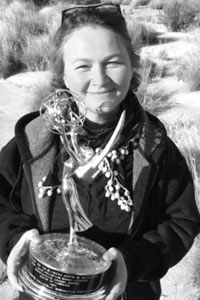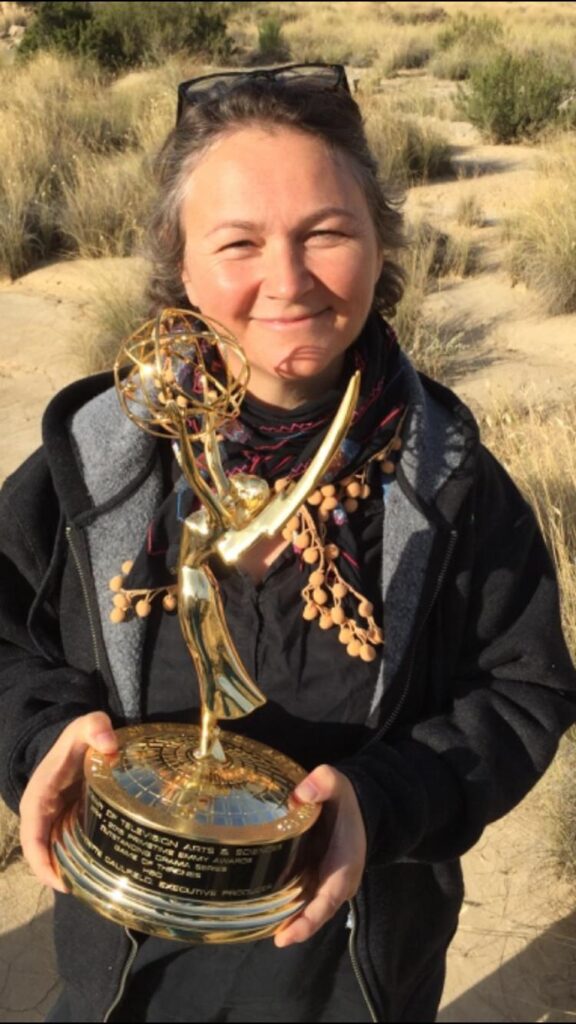
Learn a new accent with the help of Jan Haydn Rowles. One of the best accent coaches in the business, creator of The Accent Kit, accent coach to the stars, and right back in the early days of her career, Wireless Theatre voice actor. Jan has gone on to coach actors on many films and TV series including Game of Thrones and The Alienist. We can confidently say that nobody is more qualified to share their tips to help you learn a new accent. Read on for Jan’s top tips.
Make sure you have really good reliable resource material
Jan Haydn Rowles
How did you become a specialist accent coach?
I became a specialist accent coach after leaving drama school. After my first year of training I discovered acting was not for me. I loved being in the creative world of acting and theatre, but not actually performing. In my 3rd year, Lyn Darnley, the Head of Voice suggested becoming a voice coach. I was assigned the role of ‘Accent Captain’ on a couple of productions. My contemporaries were surprisingly happy to listen to my advice, and one or two close friends said “You’re really good at this!”. I left drama school and Lyn took me to voice conferences and introduced me to David Carey, who ran the voice course at the Royal Central School of Speech and Drama. I graduated from Central, then worked for 12 years in London drama schools, including East 15 and LAMDA, with hundreds of trainee actors. I met a lot of outside directors who began asking me to coach actors in theatre productions, leading to my transition to theatre.
When I began teaching in drama schools I soon realised I wanted to focus on accents, although this can never be separated entirely from voice, speech, scripts, text and the vocal demands of each piece.
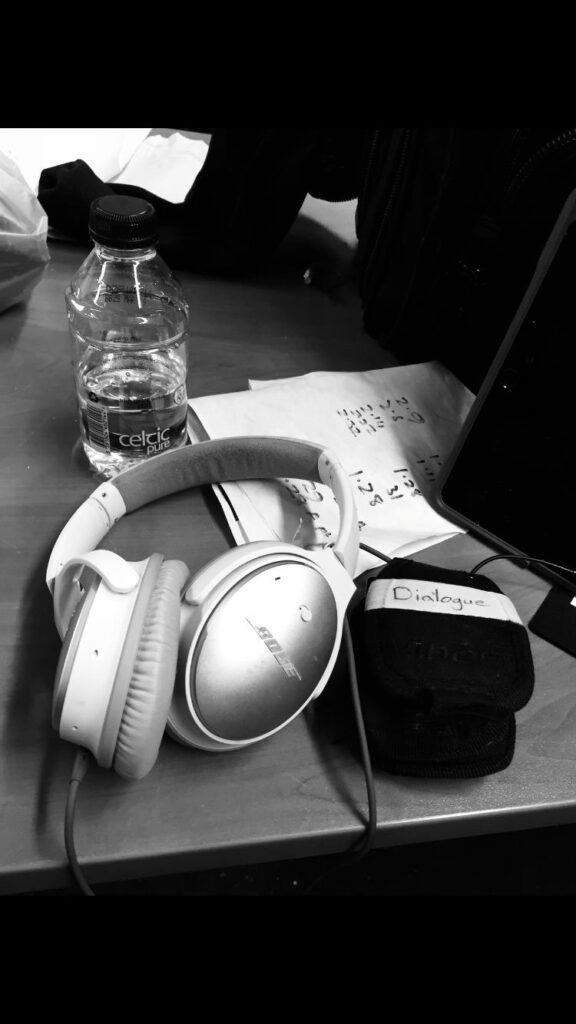
How long does it take you to learn a new accent?
It really depends on the accent and the production. I worked on season 2 of The Alienist which had a period New York setting. I had to learn Irish New York, Upper Class New York, Italian New York and Jewish New York; lots of varieties for one particular area. That took quite a long time, to really look at all the history of New York, how the languages, geographical, political and historical influence the accent development.
If it’s one person speaking in one accent set in contemporary times, and I have lots of resources I can listen to I can learn an accent in a day, but that doesn’t happen very often these days. I’m mostly employed on a tv series or film where many people need an accent. In The Alienist there are over 100 people speaking across 8 episodes. I really have to do my research which can take a month or so.
Sometimes I am called in at short notice to help with an accent I have rarely or never done, and like an actor I have 24 hours to cram learn a new accent very quickly. I prefer to have a lot of time to research and then apply that research to the script, character and world to make sure the accent and resources are appropriate to the production.
Give yourself a point of focus when you’re practising
JAN HAYDN ROWLES
How many accents can you speak in? Are there any you have yet to master?
Interesting. How many accents can I do? Do you know what, I’ve never counted! I suspect that having worked in TV and film jobs for the last ten years, I’m not doing as many accents a year as when I worked in theatre. Where I had 10 or 20 theatre jobs a year, I may have one or two TV or film jobs so I’m not learning as many new accents as I used to. Muscle memory is a great thing. I do tend to retain the accent through muscle memory and if I haven’t done an accent for a while, it doesn’t take me long to re-learn it. But accents are always changing, so the London accent that I learned ten or fifteen years ago isn’t the same as it is now. That’s the same with any city, urban accents are completely different. It’s my aim in life to learn as many accents as possible, and I’m always updating them every few years.
Game of Thrones was set in a fantasy world. How were the accents for each region decided?

I worked on Game of Thrones for season two, part of season three, all of seasons 4-6 and 8. Myself and Sally Hague joined in season 2 so a lot of the accents were already established. Sean Bean was playing the character of ‘King of the North’. He gave a period feel to it, which is partly in the writing as it’s not written with a contemporary angle. He did his own accent, which is Sheffield, Yorkshire, then anybody who was in his family of the older generation, like his older sons, took on a Northern accent.
We had a lot of Irish, Celtic and Scottish actors. If they were playing characters from the North they had to do a northern English accent. We tended to let them do whichever northern accent they felt comfortable doing, which was mostly Yorkshire with some Lancashire accents. We tended to avoid more obvious known accents like Liverpudlian as that sounded too modern. When we started season 2, Liam Cunningham had already used a North East accent in season one so some people had North Eastern accents depending where the character was from.
“Make sure the resources you’re using are from the right time period”
Jan Haydn Rowles
Are there particular accents that are hard to get right?
When I’m researching to learn a new accent I like to look at the geographical and historical influences; who were the settlers/invaders? I consider the influences of other neighbouring counties, and if there’s a community of English as a second language speakers. I’ll also look at the regions workforce, whether it’s industrial or agricultural. Climate and environment can have a big impact on an accent. Some accents tend to hold the jaw closer together. In a dusty or cold environment the jaw is held quite closed or the facial muscles don’t really move much for all sorts of different reasons. It’s also important to make sure the resources you’re using are from the right time period; you don’t want to look at modern day speakers for a period piece or vice versa.
The research element can take a long time; not so much now using the internet but in the old days we used to have to book an appointment at the British Library and go and listen to some resources, which could take a day just to listen to an hour of someone speaking. Make sure your resources are authentic. Don’t be fooled by films, sometimes it can seem as though the actors in a film are all from a particular place but it can turn out that they’re not; they’re all putting on an accent. The next step I take is to phonetically transcribe; listening to a speaker and creating a phonetic breakdown of the accent so I know what the vowel change is between my accent and the new accent. That can take quite a while, listening to the same word 100 times to work out what the vowel is. Once the phonetic transcription is finished, I look at similarities and differences between the vowel sounds.
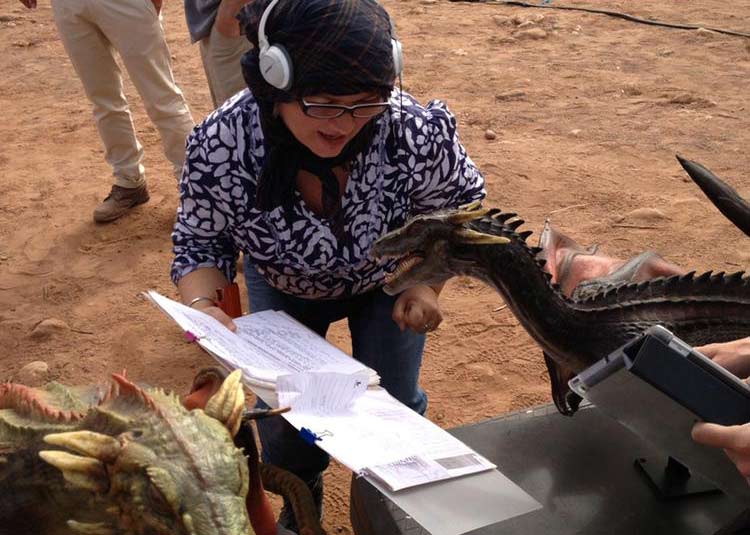
Can anyone learn a new accent convincingly, or do some people have more of a gift than others?
If the music is different between one accent and another, it can be like learning a new instrument; someone from the strings section in an orchestra suddenly having to learn a brass instrument. That can make it difficult sometimes; the melody, music and tone of an accent can be very different from yours.
Have you ever been star-struck?
I think sometimes I am star-struck by the idea of working with somebody. I’d love to work with Tom Hanks, Denzel Washington or Viola Davies. But when you’re actually with an actor and you’ve got a job to do, you tend not to actually have time to think about it, so I haven’t been star-struck ‘in the moment’. Sometimes, when I’m working with an actor, I can see it all coming together, we’re on the shoot day and I see them at work. I see how they have developed and connected the accent to the character and director’s notes and the world that they’re creating. Sometimes I’m star-struck in that moment, impressed by their ability to bring all those components together and to create this amazing moment in a scene and an amazing piece of storytelling. When I see the actor at work, putting all the work I have done with them into action, especially when the director is asking them to do something very different from perhaps how they’ve been thinking about it and I see that they can be really flexible as an actor and with the accent. That’s when I’m star-struck; it’s such a skill. Such a craft, and such a joy for me to watch, like a masterclass in acting, whilst being paid! It can be very humbling.
Which has been your favourite project to work on?
There have probably been jobs that I haven’t enjoyed, but mostly if there’s a great crew, a great cast and a collaborative director (and I’ve been very lucky to work on a lot of productions where that’s been the case) then that job is the most favourite until I get the next opportunity to work on a great storytelling project. My favourite thing is to work with director and writer, with a really good writer on set. I’m currently working on a project with Craig Pearce who’s a fantastic writer. He’s a great collaborator who enjoys working with an accent coach. If you’ve got a great team with a great director and writer who are interested in the work you’re doing and know the support you can offer to an actor then that’s a joy. I’m currently on this project with Danny Boyle and Craig Pearce who are hugely respectful of the work an accent and voice coach does and they give a lot of room for that to happen. So they are my favourite projects, working with a good director and writer who are getting on well, and include me as part of that team. That’s the best. Director, writer and accent coach working with the cast is my dream team scenario.
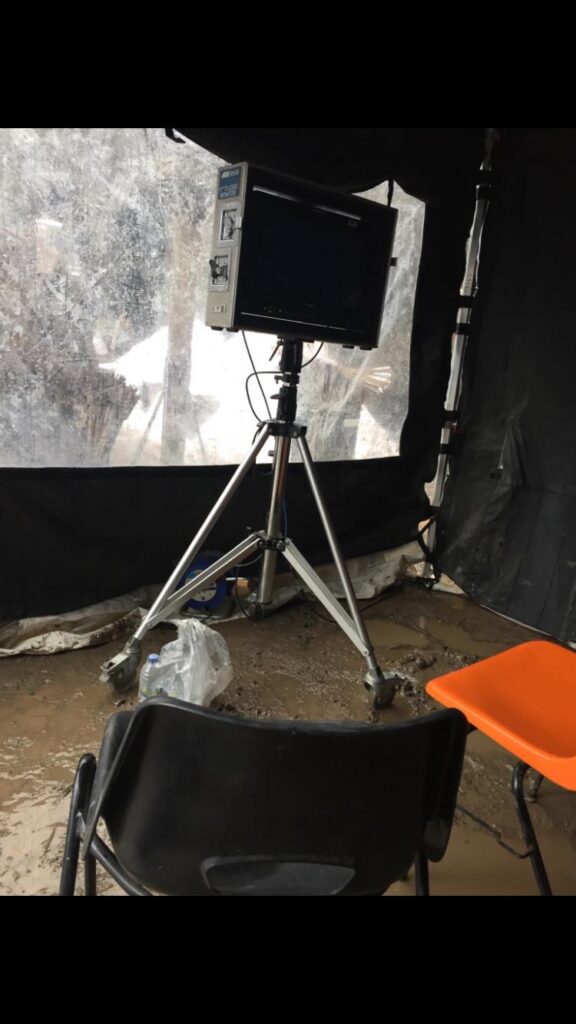
Oh, the Glamour… 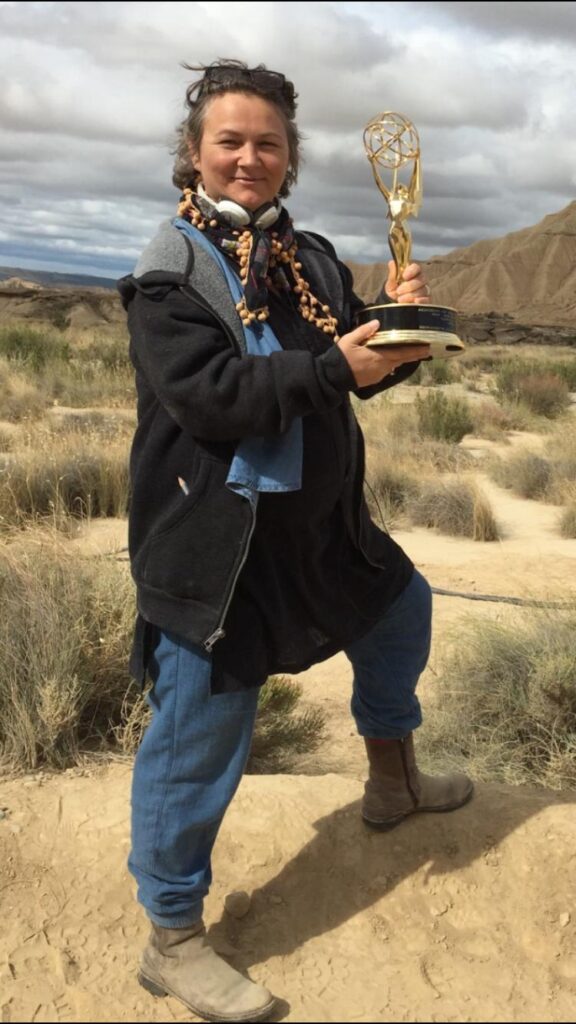
The GoT Best Drama Emmy 
The GoT Set Cranes
Do you find it hard to watch or listen to shows where an actor is doing a bad job of a particular accent?
Yeah, that’s a tricky one. My ears never seem to switch off. If its really good acting but the accent is a bit skewiff then I tend not to be so bothered but if an actor hasn’t really connected with the character and the accent is off, or the writing isn’t particularly good then you really are over-noticing how a person is speaking. In an ideal world, you shouldn’t be noticing someone doing an accent as it should just be how that character is speaking. If something is afoot, not always the accent but the character writing or direction, if its not bedded in with the accent I find it really difficult to watch or listen. If I’m really taken by the character and the story I probably do notice a bit of a bum vowel here and there but I’m not thrown into a tizzy and throwing my toys out of the pram as I’m engaged in the story. That’s what I say to my actors; we have to believe that’s how that person speaks. It may be that one or two people might notice you’ve said ‘runin’ instead of ‘running’, but if someone’s picking up on that they’re not really buying the story that you’re telling. If I’m hooked by the story I don’t get too upset. Most of the time…
“talk to someone from the area and ask what they notice or what you’re missing”
JAN HAYDN ROWLES
What’s your number one tip for actors who want to learn a new accent?
My number one tip for actors who need to learn a new accent is to make sure you have really good reliable resource material. Make sure the person you’re listening to is of an appropriate age and time in history for the character you’re playing, and from the right place. That happens quite a lot, it’s meant to be Manchester and you’ve got someone from Bolton because it’s ‘kind of the same area’. No. It’s actually not. Completely different accent. Really be specific with your resource material. Listen to your reference as much as you can. Get a couple of speakers so you’re not just tuned into one person. Practice little and often, half an hour twice a day, or twenty minutes three times a day. Give yourself a point of focus when you’re practicing; ‘Today I’m going to concentrate on this particular vowel sound’ or ‘I’m going to really focus on the rhythm or tune’. Record yourself and play it back, not to be too judgmental about yourself but to listen out for your particular focus. Try it out, go to shops, talk to people. If you’re brave enough talk to someone from the area and ask what they notice or what you’re missing. Don’t get hung up on practicing too much on your script. Try reading newspaper articles; a local newspaper from the area perhaps. If you’re doing an East London accent, get the East London local gazette. Try and read as much as you can, listen as much as you can, record yourself and listen back as much as you can. Some people find it hard to improvise in a new accent, others don’t. Work out what’s best for you. Do you like chatting in the accent or reading? Either is absolutely fine.
Tell us about The Accent Kit. How did that come about?
The Accent Kit is an app that myself and two other accent coaches Edda Sharpe and Richard Ryder devised about 7 years ago. It’s a resource for learning accents. It came about on the back of writing two books with Edda Sharpe called ‘How to do Accents’ and ‘How to do Standard English Accents’. We’d written the methodology and the process of learning an accent. Richard Ryder suggested we make it into an app so we collaborated with him and adapted the methodology of how to do accents into the app. There’s an in-app store where you can buy accents from different counties, from England, Ireland, Scotland and Wales and across Europe and other continents. We are adding to the library all the time, so when a job comes along that requires you to learn a new accent, you can see if the accent is in the store and buy it. The app has the same material across all the different accents. We have a list of vowels, practice sentences for the vowels, consonants, free speech and practice text. The app allows you to record yourself and listen, giving you all the things you need to learn a new accent. It’s available on Android and Apple.
All images reproduced with the kind permission of Jan Haydn Rowles, ©copyright Jan Haydn Rowles 2021
Read more from Jan on her website
Read more expert interviews on our blog

